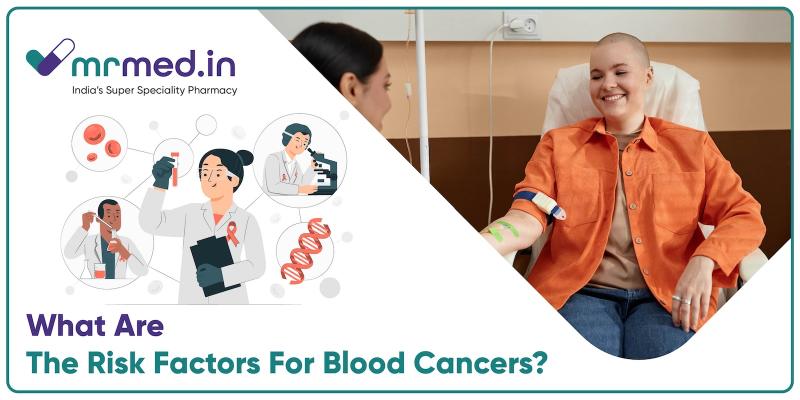Environmental and Occupational Risk Factors for Blood Cancers

Imagine waking up one day to a diagnosis that changes your lifeblood cancer. Most people think genetics play the biggest role, but did you know that where you live and work can also increase your risk? From air pollution to chemical exposure, our surroundings might be silently affecting our health. Being aware of these risks enables you to take preventive measures in time.
What environmental factors can cause blood cancer?
Environmental factors are external elements we are exposed to daily, often without realising their long-term impact.
1. Exposure to Benzene
Benzene is a widely recognised carcinogen found in gasoline, cigarette smoke, and industrial emissions. It is commonly used in chemical plants, oil refineries, and rubber manufacturing. Long-term exposure, especially in enclosed spaces, can significantly increase the risk of blood cancers.
2. Pesticides and Herbicides
Agricultural workers or people living near farms may be exposed to high levels of pesticides and herbicides. Some studies suggest that prolonged exposure to these chemicals can lead to an increased risk of leukaemia and lymphoma.
3. Radiation Exposure
High levels of ionising radiation from medical treatments, nuclear power plants, or even excessive exposure to ultraviolet (UV) rays can damage DNA and increase the likelihood of developing blood cancers. Radon, a radioactive gas found in some homes, is also a hidden danger.
4. Air Pollution
Cities with high pollution levels expose residents to toxic chemicals daily. Fine particulate matter (PM2.5) from vehicle emissions, industrial waste, and even household chemicals can contribute to cellular damage and increase cancer risk over time.
5. Household and Industrial Chemicals
Many household cleaning products contain formaldehyde, a known carcinogen. Workers in textile, plastic, and chemical industries are also at risk due to frequent exposure to harmful compounds like toluene and xylene.
How does your job increase your risk of blood cancer?
Certain occupations expose workers to harmful substances daily, making them more vulnerable to blood cancers.
1. Healthcare Workers
Nurses, radiologists, and laboratory technicians often work with chemicals and radiation. Continuous exposure, especially without proper safety measures, increases the risk of cellular mutations leading to cancer.
2. Factory and Industrial Workers
Workers in petroleum, chemical, and rubber industries face regular exposure to benzene and other hazardous substances. Without protective equipment, these chemicals can enter the bloodstream, increasing the risk of leukaemia.
3. Agricultural Workers
Farmers and pesticide sprayers are exposed to high levels of herbicides and pesticides. Long-term exposure to these chemicals has been associated to an increased risk of lymphoma and leukaemia.
4. Firefighters
Firefighters often inhale toxic fumes from burning plastics, synthetic materials, and chemicals. The mix of carcinogens in smoke can lead to an elevated risk of multiple cancers, including blood cancers.
5. Hairdressers and Beauticians
Regular exposure to hair dyes, sprays, and chemical treatments may increase the risk of blood-related disorders due to prolonged inhalation of toxic compounds.
Can lifestyle changes reduce the risk of blood cancer?
While some risk factors are unavoidable, making certain lifestyle tweaks can significantly reduce your chances of developing blood cancer.
1. Limit Exposure to Harmful Chemicals
If you work in an industry with high chemical exposure, always use protective gear.
Choose eco-friendly household cleaning products free from formaldehyde and other harmful compounds.
If you live in a high-pollution area, consider using air purifiers and wearing masks outdoors.
2. Avoid Smoking and Secondhand Smoke
Tobacco smoke contains over 7,000 chemicals, including benzene, a known trigger for leukaemia. Quitting smoking can lower your risk significantly.
3. Consume an Antioxidant-Rich Diet
Eating fruits, veggies, and whole grains can help protect your cells from damage. Antioxidants like vitamin C, vitamin E, and beta-carotene help neutralise harmful free radicals in the body.
4. Stay Active and Maintain a Healthy Weight
Obesity and a sedentary lifestyle are associated to various cancers, including blood cancers. Regular exercise can boost immunity and help your body fight off harmful changes at the cellular level.
5. Reduce Radiation Exposure
If you frequently undergo X-rays or CT scans, ask your doctor about safer alternatives. Also, test your home for radon levels, especially if you live in an area with a high concentration of this radioactive gas.
What are the stages of blood cancer?
Blood cancer progresses in different stages, depending on the type. Here’s a general breakdown of the stages of blood cancer:
Stage 1: The cancer is localised, with a small number of abnormal cells present. There may be mild symptoms or none at all.
Stage 2: The cancer starts spreading to nearby lymph nodes, possibly causing swelling or other noticeable signs.
Stage 3: The disease advances further, affecting multiple lymph nodes and organs like the spleen or liver.
Stage 4: The most severe stage, where the cancer has spread to various organs and the bone marrow, significantly impacting blood cell production.
Is there hope for blood cancer patients?
Yes! With advancements in medical research, treatment options for blood cancers have improved significantly. Patients now have access to innovative therapies, including targeted treatments, immunotherapy, and stem cell transplants.
For example, some patients benefit from medications like Imbruvica capsule containing Ibrutinib, which helps block certain proteins responsible for cancer cell growth. However, treatment varies based on individual health conditions, cancer type, and stage. Consulting a oncologist can help determine the best approach.
Final Thoughts
While genetics play a role in blood cancer, environmental and occupational factors are just as critical. Being aware of these risks and taking preventive steps can lower the chances of developing the disease. Whether it's choosing safer products, reducing exposure to harmful chemicals, or adopting a healthier lifestyle, small changes can make a big difference.
Stay informed, protect yourself, and prioritise your health. After all, prevention is always better than cure!

Comments